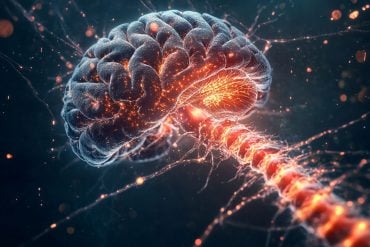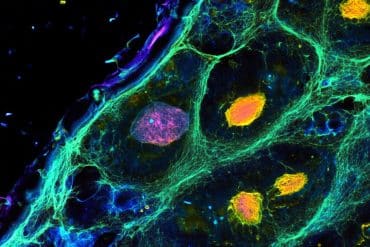Summary: Serotonin in the gut epithelium plays a critical role in modulating mood and may provide a safer target for treating depression and anxiety. In animal studies, increasing gut serotonin improved mood symptoms without causing digestive issues, unlike systemic antidepressant treatments.
Human data also showed that prenatal exposure to antidepressants raised the risk of functional constipation in children, highlighting potential side effects. The findings suggest a pathway to design gut-specific treatments that avoid systemic side effects, particularly during pregnancy and breastfeeding.
Key Facts
- Gut-Mood Connection: Serotonin in the gut epithelium improves mood without systemic side effects.
- Pregnancy Risks: Prenatal antidepressant use increases the risk of functional constipation in children.
- Therapeutic Potential: Gut-specific antidepressants may offer safer, targeted treatments for mood disorders.
Source: NYU
Researchers have discovered new connections between the gut and brain that hold promise for more targeted treatments for depression and anxiety, and could help prevent digestive issues in children by limiting the transmission of antidepressants during pregnancy.
The study, published in the journal Gastroenterology, shows that increasing serotonin in the gut epithelium—the thin layer of cells lining the small and large intestines—improves symptoms of anxiety and depression in animal studies.
The researchers also found that, in humans, antidepressant use during pregnancy increases the risk of babies developing constipation in the first year of life.

“Our findings suggest that there may be an advantage to targeting antidepressants selectively to the gut epithelium, as systemic treatment may not be necessary for eliciting the drugs’ benefits but may be contributing to digestive issues in children exposed during pregnancy,” said Kara Margolis, director of the NYU Pain Research Center and associate professor of molecular pathobiology at NYU College of Dentistry, who co-led the study with Mark Ansorge, associate professor of clinical neurobiology at Columbia University.
Anxiety and depression are among the most common mental health conditions in the US, with one in five adults experiencing symptoms. Many people with mood disorders also experience disorders of gut-brain interaction (DGBI), digestive issues such as irritable bowel syndrome and functional constipation that result from communication issues between the gut and brain.
Antidepressants—including selective serotonin reuptake inhibitors, or SSRIs—are widely prescribed for depression, anxiety, and DGBIs. While these drugs are generally considered to be safe, they can come with side effects such as gastrointestinal issues and anxiety—“the very symptoms they are sometimes designed to treat,” said Ansorge—especially early during treatment with an SSRI, which may lead people to stop taking the medication.
Antidepressants also pose challenges during and after pregnancy because of their ability to pass through the placenta and breast milk. Some studies show a higher incidence of mood and cognitive disorders in children exposed to SSRIs during pregnancy, although other studies have conflicting results.
Untreated depression and anxiety during pregnancy have known risks for both the mother and baby, so expectant mothers have to weigh the potential risks of taking medication with their mental health needs.
SSRIs work by blocking a protein called the serotonin transporter, raising serotonin levels in the brain. However, the vast majority of the body’s serotonin is produced in the gut, and the serotonin transporter also lines the intestines.
“For psychiatric medications that act on receptors in the brain, many of those same receptors are in the gut, so you have to consider the effects on gut development and function,” said Margolis, who is also an associate professor of pediatrics and cell biology at NYU Grossman School of Medicine.
To better understand the connection between serotonin in the gut and mood and gastrointestinal disorders, the researchers studied several mouse models in which the serotonin transporter was removed or blocked.
Previous studies led by Margolis found that mice bred to lack the serotonin transporter throughout the body, as well as mice that were exposed to SSRIs during and after pregnancy, experienced changes in the development of the digestive system and dysfunction in motility in the gut.
In the Gastroenterology study, the researchers looked at the role of serotonin in the gut specifically by studying mice lacking the serotonin transporter in the gut epithelium either during development (mimicking exposure to an SSRI during pregnancy) or in young adulthood (akin to taking an SSRI as an adult).
Removing the serotonin transporter from the gut epithelium increased serotonin levels and led to improvements in anxiety and depression symptoms in both groups of mice. It also spared them from the adverse effects on digestion and motility that were found in the previous research where the serotonin transporter was missing or blocked throughout the body.
“This adds a critical perspective to the long-held idea that the therapeutic effects of SSRIs come from directly targeting the central nervous system and suggests a role for the gut,” said Ansorge.
The researchers also determined that vagus nerves—a key highway of communication between the digestive system and brain—are the path by which serotonin in the gut epithelium modulates mood. Cutting off this communication in mice in one direction—from gut to brain—removed improvements in anxiety and depression.
To explore whether blocking the serotonin transporter in humans leads to similar digestive issues as seen in mice, the researchers also looked at the use of antidepressants during pregnancy.
They studied more than 400 pairs of mothers—a quarter of whom were taking antidepressants (SSRIs or SNRIs)—and their babies, and followed them during pregnancy and throughout the children’s first year of life.
The use of antidepressants during pregnancy significantly increased the risk of a child experiencing functional constipation, a highly common DGBI which may be painful, during their first year of life.
“We found that, at the age of one, 63% of children exposed to antidepressants during pregnancy experienced constipation, compared with 31% of children whose mothers did not take medication,” said Larissa Takser, professor of pediatrics at the Université de Sherbrooke in Québec and an author of the study.
“This finding suggests a potential connection between serotonin levels in utero and gut development, and opens new doors to examine SSRI properties not previously studied.”
The researchers strongly caution that these findings should not change clinical practice and influence whether mothers continue to take SSRIs during pregnancy due to the risk of constipation in their children, given the known risks of untreated maternal depression and anxiety.
“These are not clinical guidelines—rather, they are a call that more research is needed on the connection between SSRIs, serotonin, and the gut,” said Margolis. “It’s recommended that mothers and providers together consider treatment options that have been shown to be successful, including medications and cognitive behavioral therapy.”
Together, the findings from mice and humans reveal a promising avenue of future studies: the gut epithelium as a new and potentially safer target for treating mood disorders, particularly for pregnant women.
“Systemically blocking the serotonin transporter appears to play a role in the development of digestive issues in both mice and humans. However, restricting an antidepressant to inhibit the serotonin transporter only in the gut epithelium could avoid these adverse effects and limit the drug’s transmission during pregnancy and breastfeeding,” said Margolis.
The study was a collaboration among researchers at the NYU Pain Research Center, Columbia University, Université de Sherbrooke in Quebec, Pennsylvania State College of Medicine, Duke University School of Medicine, Baylor College of Medicine, and Albert Einstein College of Medicine.
Funding: The research is supported in part by the National Institutes of Health (R01MH119510, R01DK130517, P01-AI152999, NIDDK-DD56338, F32DK132810, DK111667, R01NS015547, R01-DK130517, R01DK130518, and R01DK126644), the Department of Defense (W911NF-21-S-0008, PR160365), and the North American Society for Pediatric Gastroenterology, Hepatology and Nutrition Takeda Innovation Award.
About this depression research news
Author: Rachel Harrison
Source: NYU
Contact: Rachel Harrison – NYU
Image: The image is credited to Neuroscience News
Original Research: Open access.
“Intestinal Epithelial Serotonin as a Novel Target for Treating Disorders of Gut-Brain Interaction and Mood” by Kara Margolis et al. Gastroenterology
Abstract
Intestinal Epithelial Serotonin as a Novel Target for Treating Disorders of Gut-Brain Interaction and Mood
Background & Aims
Mood disorders and DGBI are highly prevalent, commonly co-morbid and lack fully effective therapies. Although SSRIs are first line pharmacological treatments for these disorders, they may impart adverse effects including anxiety, anhedonia, dysmotility and, in children exposed in utero, an increased risk of cognitive, mood and gastrointestinal disorders.
SSRIs act systemically to block SERT and enhance serotonergic signaling in the brain, intestinal epithelium and enteric neurons. Yet, the compartments that mediate the therapeutic and adverse effects of SSRIs are unknown, as is whether gestational SSRI exposure directly contributes to human DGBI development.
Methods
We utilized transgenic, surgical, and pharmacological approaches to study the effects of intestinal epithelial SERT or serotonin on mood and gastrointestinal function, as well as relevant communication pathways. We also conducted a prospective birth cohort study to assess effects of gestational SSRI exposure on DGBI development.
Results
SERT ablation targeted to the intestinal epithelium promoted anxiolytic and anti-depressive-like effects without causing adverse effects on the gastrointestinal tract or brain; conversely, epithelial serotonin synthesis inhibition increased anxiety and depression-like behaviors. Afferent vagal pathways were found to be conduits by which intestinal epithelial serotonin affects behavior.
In utero SSRI exposure is a significant and specific risk factor for development of the DGBI, functional constipation, in the first year of life, irrespective of maternal depressive symptoms.
Conclusion
These findings provide fundamental insights into how the gastrointestinal tract modulates emotional behaviors, reveal a novel gut-targeted therapeutic approach for mood modulation and suggest a new link in humans between in utero SSRI exposure and DGBI development.






